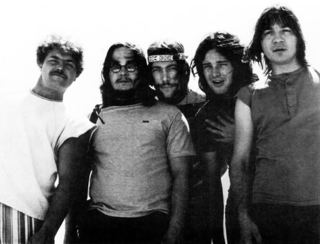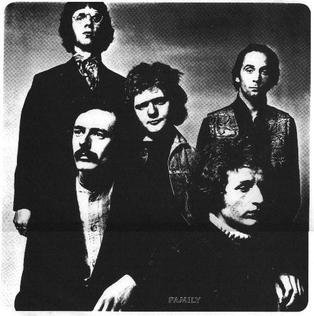Related Research Articles

Creedence Clearwater Revival, commonly abbreviated as CCR, was an American rock band formed in El Cerrito, California. The band initially consisted of lead vocalist, lead guitarist, and primary songwriter John Fogerty; his brother, rhythm guitarist Tom Fogerty; bassist Stu Cook; and drummer Doug Clifford. These members had played together since 1959, first as the Blue Velvets and later as the Golliwogs, before settling on Creedence Clearwater Revival in 1967. The band's most prolific and successful period between 1969 and 1971 produced fourteen consecutive top 10 singles and five consecutive top 10 albums in the United States – two of which, Green River (1969) and Cosmo's Factory (1970), reached number one. The band performed at the 1969 Woodstock festival in Upstate New York, and was the first major act signed to appear there.

Mott the Hoople were an English rock band formed in Herefordshire. Originally known as the Doc Thomas Group, the group changed their name after signing with Island Records in 1969. The band released albums at the beginning of the 1970s but failed to find commercial success. On the verge of breaking up, the band were encouraged by David Bowie to stay together. Bowie wrote the glam rock song "All the Young Dudes" for them, which became a huge commercial success in 1972. Bowie subsequently produced an album of the same name for them, which continued their success.

The Guess Who are a Canadian rock band formed in Winnipeg, Manitoba, in 1965. The band originated in 1962 and achieved an international hit single with a cover of "Shakin' All Over" in 1965 under the name Chad Allan and the Expressions. After changing their name to The Guess Who, they found their greatest success in the late 60s and early 70s, under the leadership of singer/keyboardist Burton Cummings and guitarist Randy Bachman, with hit songs including "American Woman", "These Eyes", and "No Time".

Herbert Jay Solomon, known by his stage name Herbie Mann, was an American jazz flute player and important early practitioner of world music. Early in his career, he also played tenor saxophone and clarinet, but Mann was among the first jazz musicians to specialize on the flute. His most popular single was "Hi-Jack", which was a Billboard No. 1 dance hit for three weeks in 1975.

The Hollies are a British rock and pop band formed in 1962. One of the leading British groups of the 1960s and into the mid-1970s, they are known for their distinctive three-part vocal harmony style. Allan Clarke and Graham Nash founded the band as a Merseybeat-type group in Manchester, although some of the band members came from towns further north, in east Lancashire. Nash left the group in 1968 to form Crosby, Stills & Nash, though he has reunited with the Hollies on occasion.

Paul Revere & the Raiders were an American rock band formed in Boise, Idaho, in 1958. They saw considerable U.S. mainstream success in the second half of the 1960s and early 1970s. The band was known for including Revolutionary War-style clothes in their attire.

The Shadows of Knight were an American rock band from Chicago, Illinois, that played a version of British blues influenced by their native city. When they began recording in 1965, the band's self-description was "the Stones, Animals and the Yardbirds took the Chicago blues and gave it an English interpretation. We've taken the English version of the Blues and re-added a Chicago touch," to which rock critic Richie Unterberger commented: "The Shadows of Knight's self-description was fairly accurate."

Chilliwack is a Canadian rock band centred on the singer and guitarist Bill Henderson. They were active from 1970 to 1988; Henderson re-formed the band in 1997. The band started off with a progressive rock sound that incorporated elements of folk, indigenous, jazz and blues, before moving towards a more straight-ahead hard rock/pop rock sound by the mid-1970s. Their six best-selling songs were "My Girl ", "I Believe", "Whatcha Gonna Do", "Fly at Night", "Crazy Talk" and "Lonesome Mary". The band's line-up has changed many times.
Lighthouse is a Canadian rock band formed in 1969 in Toronto, Ontario, whose repertoire included elements of rock music, jazz, classical music, and swing and featured horns, string instruments, and vibraphone. They won Juno Awards for Best Canadian Group of the Year in 1972, 1973, and 1974.

Caravan are an English rock band from the Canterbury area, founded by former Wilde Flowers members David Sinclair, Richard Sinclair, Pye Hastings, and Richard Coughlan in 1968. The band have never achieved the great commercial success that was widely predicted for them at the beginning of their career, but are nevertheless considered a key part of the Canterbury scene of progressive rock acts, blending psychedelic rock, jazz, and classical influences to create a distinctive sound.

The Mothers of Invention was an American rock band from California. Formed in 1964, their work is marked by the use of sonic experimentation, innovative album art, and elaborate live shows.

The Sir Douglas Quintet was an American rock band, formed in San Antonio in 1964. With their first hits, they were acclaimed in their home state. When their career was established, the band relocated to the West Coast. Their move coincided with the burgeoning San Francisco psychedelic rock scene of the mid 1960s to early 1970s. Overall, the quintet were exponents of good-times music with strong roots in blues and Texas-regional traditions. The band's songs were most noted for the instantly distinguishable organ sound of Augie Meyers' Vox Continental.

The Spencer Davis Group were a British band formed in Birmingham in 1963 by Spencer Davis (guitar), brothers Steve Winwood and Muff Winwood, and Pete York (drums). Their best known songs include the UK number ones "Somebody Help Me" and "Keep on Running", "I'm a Man" and "Gimme Some Lovin'", which reached #2 in the UK and #7 in the US.

Family were an English rock band, active from late 1966 to October 1973, and again since 2013 for a series of live shows. Their style has been characterised as progressive rock, as their sound often explored other genres, incorporating elements of styles such as folk, psychedelia, acid rock, jazz fusion, and rock and roll. The band achieved recognition in the United Kingdom through their albums, club and concert tours, and appearances at festivals.
Vancouver, British Columbia, is one of Canada's largest cities and foremost cultural centres.
Doug and the Slugs are a Canadian pop music group formed in 1977 in Vancouver, British Columbia. The band enjoyed a number of Canadian top 40 hits in the 1980s, most notably "Too Bad" (1980), "Who Knows How To Make Love Stay" (1982), "Making It Work" (1983), "Day by Day" (1984) and "Tomcat Prowl" (1988). The song "Too Bad" served as the theme song for the 1999-2001 ABC sitcom The Norm Show, starring Norm Macdonald.
Motherlode was a Canadian pop rock group formed in 1969 in London, Ontario. The group scored some success in the US with their single, "When I Die", which hit #1 in Canada and #18 on the U.S. Billboard Hot 100 chart in 1969. The group didn't have a bass guitarist. William Smith would play the bass notes on his keyboard. They did however use bass players on their studio recordings.

The Velvet Underground was an American rock band formed in New York City in 1964. It originally comprised singer and guitarist Lou Reed, Welsh multi-instrumentalist John Cale, guitarist Sterling Morrison, and drummer Angus MacLise. MacLise was replaced by Moe Tucker in 1965, who played on most of the band's recordings. Though their integration of rock and the avant-garde achieved little commercial success, they became one of the most influential bands in rock, underground, experimental, and alternative music. Their provocative subject matter, musical experiments, and nihilistic attitude was also instrumental in the development of punk rock, new wave and several other genres.

The Daily Flash are an American folk rock and psychedelic band founded in 1965, active until 1968 and reformed in 2002. originally based in Seattle and later in Los Angeles. The group was composed of guitarist/singer Steve Lalor, lead guitarist Doug Hastings, bass player/singer Don MacAllister and drummer Jon Keliehor. According to Mike Stax, they "had become a major force in the growing Seattle underground scene by 1965." Their sound, which incorporated elements of folk music and jazz as well as rock stood in contrast to the garage rock sound typical of the Pacific Northwest at the time, anticipating the sound that came to be identified with San Francisco.
Jerry Donald Fisher is an American R&B singer – Texas-born and Oklahoma-reared – known internationally for being the lead vocal with Blood, Sweat & Tears from 1971 to 1975. He is known to Dallas music fans for his R&B gigs from 1964 to 1972, and known in Bay Saint Louis as one-half of the husband–wife proprietorship of "Dock of the Bay," a restaurant and nightclub owned and operated by the two from 1976 to the spring of 2005, when they sold it a few months before Hurricane Katrina blew it away.
References
- ↑ Anstey, Robert G. (2005). Sandalspring Notebook. West Coast Paradise Publishing. ISBN 1-897031-18-1.
- ↑ "Pacific Northwest Bands" . Retrieved 2009-11-25.
- ↑ Anstey, Robert G. (2002). Sandalspring: The Life And Times. West Coast Paradise Publishing. ISBN 1-896779-79-4.